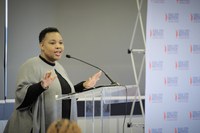Soul City Institute condemns the reinstatement of the Global Gag Rule, calling it a devastating blow to global health, gender equity and reproductive justice.
We regret to inform you that the abovementioned tender has been cancelled. After a thorough review, it has come to our attention that the specifications provided in the tender documents were insufficient and do not adequately outline the requirements of the project.
Soul City Institute would like to congratulate the class of 2024 for their historical milestone. The class of 2024 has excelled with a Matric pass rate of 87.3%. This has shown their dedication and determination to reach the stars and commitment to their future.
We are pleased to inform you that your firm is invited to participate in the open tender procedure for the above contract.
We are pleased to inform you that your firm is invited to participate in the open tender procedure for the above contract.
Gender-based violence (GBV) remains a dire crisis in South Africa, as highlighted by a tragic recent incident. The Soul City Institute calls for systemic change beyond campaigns like 16 Days of Activism. Addressing GBV requires prevention, accountability, education, and survivor support, while tackling the harmful normalisation of violence in society and digital spaces.
The International Planned Parenthood Federation (IPPF, in partnership with Soul City Institute, are engaging with global experts on the intersection of sexual and gender-based violence (SGBV) and sexual and reproductive health (SRH) services.
Soul City Institute Advocates for Contraceptive Access and Safe Abortion
 The Reinstatement of the Global Gag Rule: A Step Backward for Global Health and Gender Equity
The Reinstatement of the Global Gag Rule: A Step Backward for Global Health and Gender Equity








